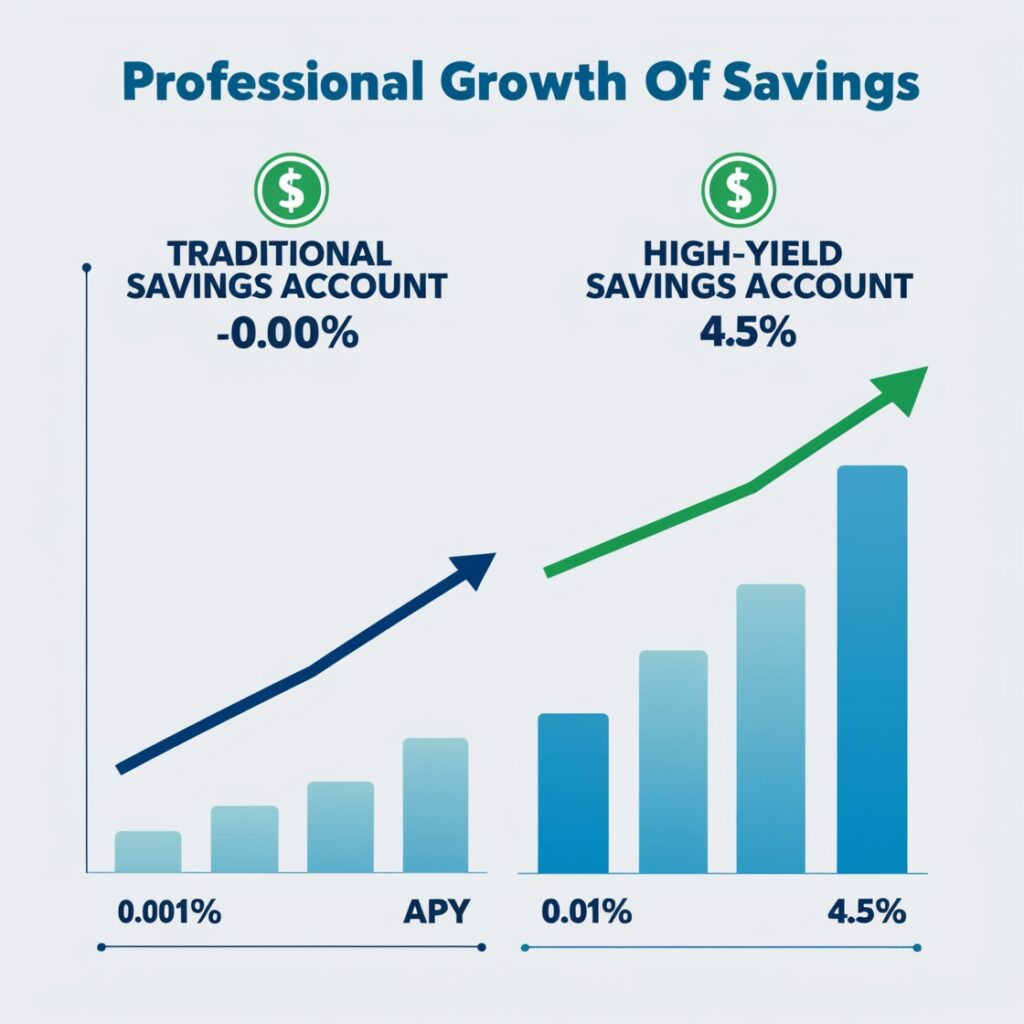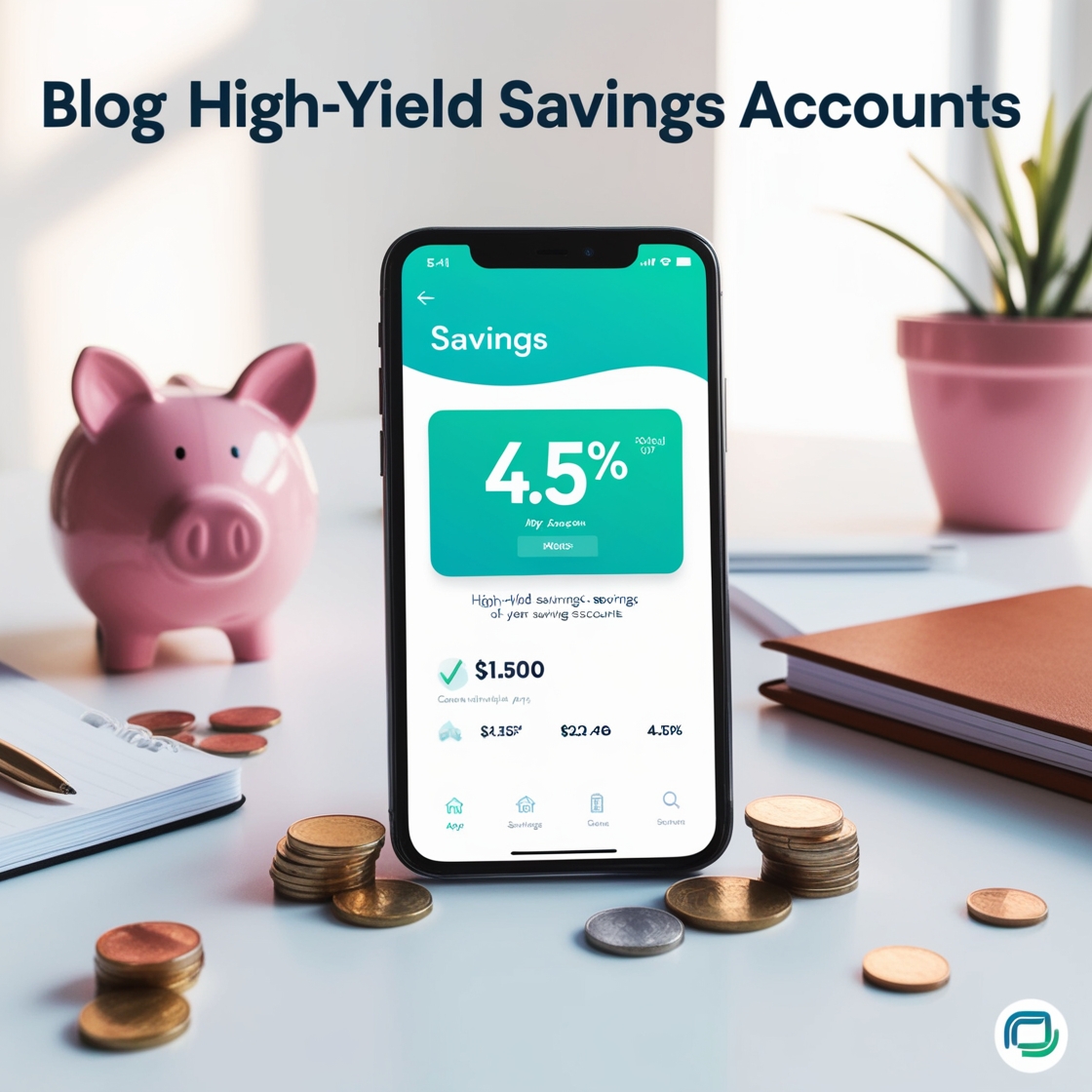Saving money is the cornerstone of financial health. Whether you’re building an emergency fund, preparing for a large purchase, or simply looking for a secure place to grow your funds, high-yield savings accounts (HYSAs) offer a compelling solution. These accounts provide much higher interest rates than traditional savings accounts, allowing you to earn more while keeping your money safe and accessible.
In this guide, we’ll cover everything you need to know about HYSAs, from their benefits and features to tips for maximizing their potential. Let’s dive in!
What Are High-Yield Savings Accounts?
At its core, a high-yield savings account is a specialized type of savings account that pays a significantly higher Annual Percentage Yield (APY) than standard savings accounts. While traditional savings accounts offer APYs as low as 0.01%, HYSAs typically range from 3.50% to 5.00% or higher, depending on the institution and current market conditions.
These accounts are primarily offered by online banks, which have lower overhead costs compared to brick-and-mortar institutions. By passing these savings onto customers, online banks can offer competitive rates.
Key Characteristics of HYSAs
- High Interest Rates: Far superior to traditional savings accounts.
- FDIC or NCUA Insurance: Your deposits are insured up to $250,000 per depositor.
- Easy Accessibility: Manage your account online or through mobile apps.
- Limited Withdrawals: Federal regulations typically cap withdrawals at six per month.

Why Choose a High-Yield Savings Account?
HYSAs are an excellent choice for those looking to earn more interest without taking on significant risks. Here’s why they stand out:
1. Higher Earnings
With APYs often exceeding 4.00%, your money grows faster compared to traditional accounts. For example, $10,000 in an HYSA with a 4.50% APY can earn around $450 in a year—far more than the $1 or $2 earned in a standard account.
2. Safety and Security
HYSAs are FDIC or NCUA-insured, ensuring your money is protected even if the bank or credit union fails. This makes them a low-risk option for savers.
3. Liquidity
Unlike certificates of deposit (CDs), which lock your funds for a specific term, HYSAs allow you to withdraw money when needed, albeit with some limits on transaction frequency.
4. Fee-Free Options
Many online banks eliminate maintenance fees, allowing you to save without worrying about hidden charges eating into your earnings.
5. Ease of Use
With intuitive mobile apps and online platforms, managing your account is simple and convenient.
How Do High-Yield Savings Accounts Work?
High-yield savings accounts operate similarly to traditional savings accounts but with one major difference: the interest rates. Banks offering HYSAs use your deposits for loans or investments and return a portion of the profits to you as interest.
The magic of compound interest makes these accounts especially powerful. Interest is typically calculated daily and paid monthly, meaning your savings grow faster as the interest earned begins to earn its own interest.
Best High-Yield Savings Accounts of 2025
If you’re ready to open an HYSA, here are some of the top options:
1. Marcus by Goldman Sachs
- APY: 4.40%
- Features: No fees or minimum balance requirements; user-friendly interface.
2. Ally Bank
- APY: 4.25%
- Features: Round-the-clock customer support and excellent digital tools.
3. Discover Online Savings Account
- APY: 4.15%
- Features: 24/7 customer service, no monthly fees, and no minimum deposit.
4. SoFi Checking and Savings
- APY: 4.50% (with direct deposit).
- Features: Combines checking and savings for flexibility; no fees.
5. Capital One 360 Performance Savings
- APY: 4.20%
- Features: No fees, easy online account setup, and top-notch customer support.
How to Choose the Right High-Yield Savings Account
1. APY (Annual Percentage Yield)
The higher the APY, the better your returns. Compare rates across different banks to ensure you’re getting the most competitive option.
2. Minimum Deposit Requirements
Some HYSAs require an initial deposit to open the account. Look for accounts with low or no minimums if you’re starting small.
3. Fee Transparency
Hidden fees can erode your savings. Opt for accounts with no monthly maintenance or transaction fees.
4. Accessibility
Ensure the account allows easy deposits and withdrawals. A good HYSA should provide online and mobile banking options for convenience.
5. Reputation
Read customer reviews to assess the bank’s service quality and reliability.
High-Yield Savings Accounts vs. Other Options
Traditional Savings Accounts
While HYSAs offer higher interest rates, traditional accounts may have fewer restrictions on withdrawals.
Certificates of Deposit (CDs)
CDs may offer competitive rates but lack the flexibility of HYSAs. Funds are locked for a fixed term, making them less liquid.
Money Market Accounts
Money market accounts often require higher minimum balances and may have comparable or slightly lower APYs.
Common Uses for High-Yield Savings Accounts
1. Emergency Fund
An HYSA is ideal for storing your emergency fund due to its liquidity and safety. Aim for 3-6 months’ worth of expenses.
2. Short-Term Savings Goals
Whether you’re saving for a vacation, wedding, or home improvement project, HYSAs can help you reach your goals faster.
3. Supplement to Investments
While not a substitute for long-term investments like stocks, HYSAs are a great place to park money temporarily while earning decent returns.

Maximizing Your High-Yield Savings Account
To get the most out of your HYSA, follow these tips:
1. Automate Your Savings
Set up recurring transfers to your HYSA from your checking account. This ensures consistent contributions.
2. Shop Around for Rates
Interest rates fluctuate, so regularly compare your account’s APY with other offerings to ensure you’re getting the best deal.
3. Avoid Frequent Withdrawals
Limit withdrawals to comply with federal regulations and avoid penalties.
4. Combine with Budgeting Tools
Use financial apps to track your savings progress and stay on top of your goals.
FAQs About High-Yield Savings Accounts
Are high-yield savings accounts safe?
Yes, they are insured by the FDIC or NCUA, protecting deposits up to $250,000 per depositor.
Do HYSAs have fees?
Most online banks offering HYSAs have no maintenance fees.
Can I lose money in an HYSA?
No, as long as the bank is insured. However, interest rates may fluctuate, which can impact earnings.
Is interest from HYSAs taxable?
Yes, the interest earned is considered taxable income and must be reported on your tax return.
Conclusion
High-yield savings accounts are an excellent way to grow your money while keeping it safe and accessible. With competitive interest rates, no hidden fees, and the power of compound interest, these accounts offer a secure, low-risk option for savers at every stage of their financial journey.
Start researching the best HYSA for your needs today, automate your contributions, and watch your savings grow faster than ever. Your financial goals are within reach—with the right account, achieving them becomes easier and more rewarding.





